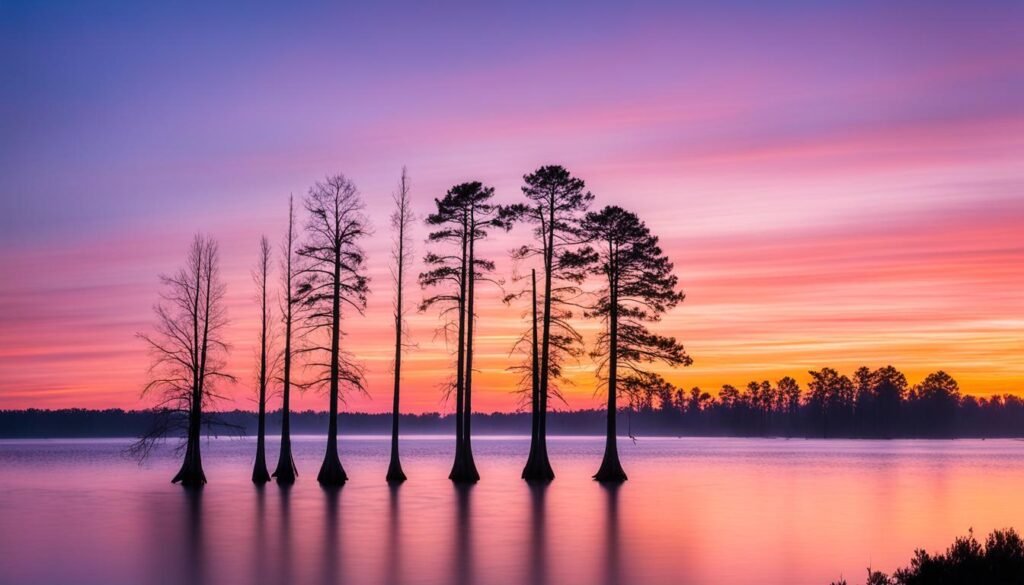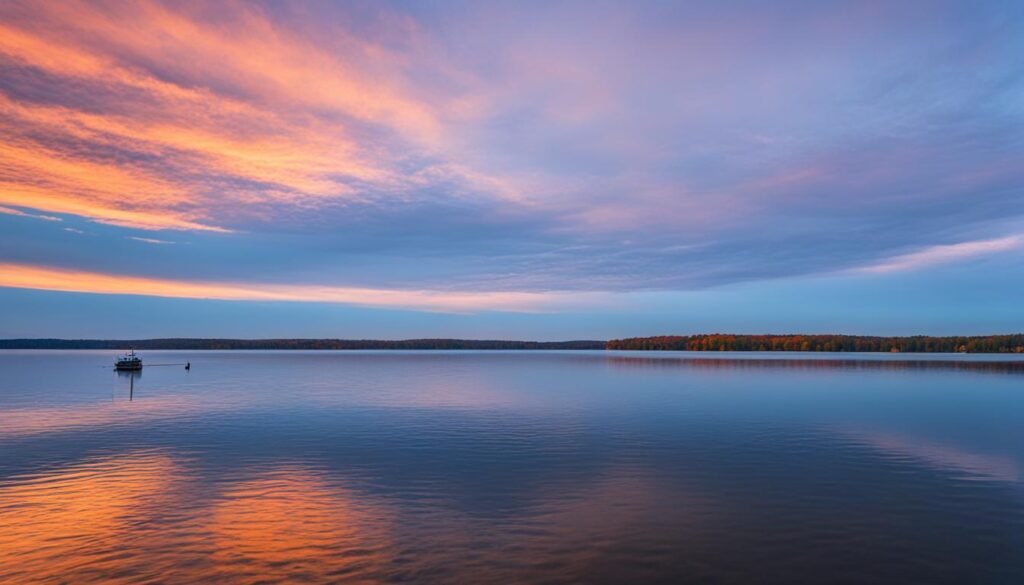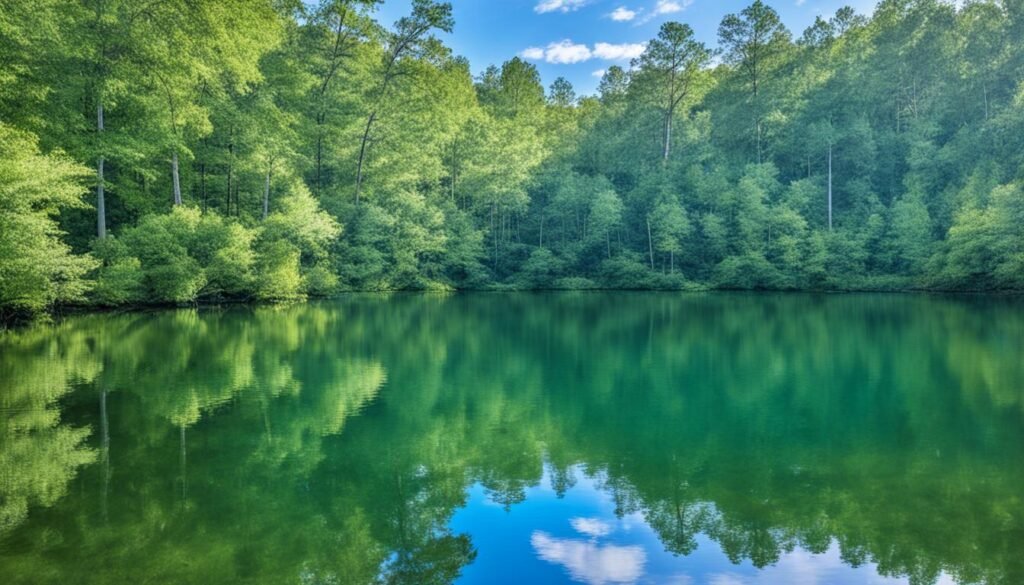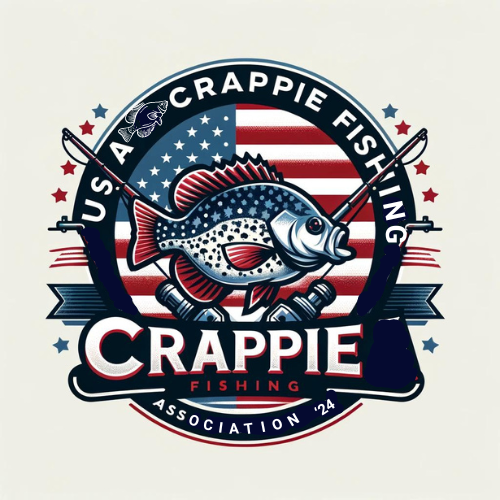Imagine a serene lake, the water shimmering in the golden sunlight. You cast your line and patiently wait, feeling the anticipation building. Suddenly, there is a tug on your fishing rod, and you know you’ve hooked something big. You reel it in, and to your delight, you’ve caught a massive crappie, its vibrant colors glimmering in the sunlight. This is the experience crappie anglers dream of – finding the perfect spot where the crappies are abundant and the fishing is exceptional.
Welcome to Crappie Heaven, where the top crappie lakes in the US are revealed. These lakes are known for their fertile waters, ample cover, and abundant forage, creating the ideal conditions for crappie to thrive and grow to impressive sizes.
In this article, we will explore the top 5 crappie lakes in the US, where anglers can experience the thrill of reeling in these prized panfish. From Mississippi to South Carolina, these lakes offer a range of unique features and fishing techniques that make them a haven for crappie enthusiasts.
Key Takeaways:
- Discover the top 5 crappie lakes in the US, where anglers can enjoy exceptional fishing experiences.
- Learn about the unique features and fishing techniques that make these lakes a paradise for crappie enthusiasts.
- Explore the diverse habitats, from flooded timber to sunken brush, that attract large crappies.
- Uncover the secrets of successful crappie fishing, including trolling channel edges, pitching jigs, and using larger bass-sized crankbaits.
- Embark on unforgettable crappie fishing adventures at these top-rated lakes and experience the true Crappie Heaven.
Grenada Lake, Mississippi
Grenada Lake in Mississippi is known for its abundant population of giant crappies, earning it the reputation of being “The King Of The 3 Pound Crappie.” Anglers from all over the country flock to this beautiful lake in search of trophy-sized fish and unforgettable fishing experiences.
The key to Grenada Lake’s success as a crappie fishing destination lies in its unique features. The lake is home to massive crappies that can reach up to 3 pounds, providing anglers with thrilling battles and bragging rights. The combination of fertile waters, ample food sources, and favorable habitat conditions creates the perfect environment for these giant crappies to thrive.
When targeting crappies at Grenada Lake, anglers often concentrate their efforts along the channel edges. These areas serve as natural highways for crappies as they move and feed. Trolling with larger bass-sized crankbaits allows anglers to cover more water and present a tempting meal to these voracious fish.
Another fruitful technique at Grenada Lake is fishing around flooded timber. Crappies seek shelter and ambush prey in the submerged trees, making them prime targets for anglers. By strategically casting and retrieving baits near the flooded timber, anglers can entice even the wariest crappies to bite.
Grenada Lake is a crappie angler’s dream. With its giant crappies, diverse fishing strategies, and picturesque surroundings, it’s no wonder why this lake is considered one of the top crappie lakes in the US.
To enhance your chances of landing a trophy crappie at Grenada Lake, it’s essential to equip yourself with the right gear and tackle. Here’s a list of recommended essentials:
- Bass-sized crankbaits
- Light to medium spinning or casting rods
- 6 to 8-pound test fishing line
- Jigheads and soft plastic grubs or minnow imitations
- Quality fishing pliers
- A landing net
With these tools in hand and a bit of patience and persistence, you’ll be ready to take on Grenada Lake’s giant crappies and create lasting memories.
Grenada Lake Crappie Fishing Essentials
| Item | Recommended |
|---|---|
| Bass-sized crankbaits | Yes |
| Light to medium spinning or casting rods | Yes |
| 6 to 8-pound test fishing line | Yes |
| Jigheads and soft plastic grubs or minnow imitations | Yes |
| Quality fishing pliers | Yes |
| A landing net | Yes |
Prepare yourself for a thrilling crappie fishing adventure at Grenada Lake, where the opportunity to catch giant crappies awaits at every cast. Don’t miss out on the chance to experience the thrill of battling these incredible fish in the beautiful surroundings of Grenada Lake, Mississippi.
Reelfoot Lake, Tennessee
Reelfoot Lake in Tennessee is a crappie angler’s paradise. Situated on 13,000 acres of marshland, this lake offers a unique fishing experience surrounded by picturesque landscapes. The lake’s abundant timber, stumps, and vegetation provide excellent cover for crappies, attracting anglers from near and far.
One of the most effective techniques for targeting crappies at Reelfoot Lake is drifting. Anglers can drift along the stumps and timber, using spider-rigging tubes to entice the fish. The key is to drop the tubes about 3 feet down over the 6-foot stump flats, where crappies frequently congregate.
Here’s a detailed breakdown of the top features and techniques used at Reelfoot Lake:
Key Features:
- Marshland
- Timber
- Stumps
Effective Techniques:
- Drifting
- Spider-rigging tubes
Reelfoot Lake is not only a popular crappie fishing destination but also a scenic marvel. To get a glimpse of its awe-inspiring beauty, check out the image below:

| Features | Techniques |
|---|---|
| Marshland | Drifting |
| Timber | Spider-rigging tubes |
| Stumps |
Lake of the Woods, Ontario
Lake of the Woods is a massive lake system that stretches across the Minnesota/Ontario border. With its vast expanse of 65,000 miles of shoreline and over 14,500 islands, this lake offers an abundance of excellent crappie habitat, making it a prime destination for anglers seeking trophy slabs.
One of the unique features of Lake of the Woods is its popularity for ice fishing. During the winter months, when the lake is covered in a thick layer of ice, anglers flock to this frozen wonderland to experience the thrill of catching crappies through the ice. Ice fishing on Lake of the Woods provides a unique and exhilarating experience for crappie enthusiasts.
Anglers can set up their ice fishing shelters on the frozen surface of the lake, drill holes in the ice, and drop their lines in search of trophy slabs. The serene winter landscape, coupled with the excitement of reeling in a big crappie, creates a truly memorable ice fishing adventure.
Whether you prefer the warmer months or the frozen winter scenery, Lake of the Woods offers unparalleled crappie fishing opportunities. With its stunning natural beauty and the thrill of catching trophy slabs, it’s no wonder why Lake of the Woods is considered one of the top crappie lakes in the US.
Shelbyville Lake, Illinois
Shelbyville Lake in Illinois is a hidden gem among crappie fishing enthusiasts, offering an enticing combination of natural features that attract large numbers of crappies. With its 11,000-acre reservoir, Shelbyville Lake provides ample opportunity for anglers to reel in trophy-sized fish. The lake is particularly renowned for its abundance of sunken brush, river channel ledges, and offshore structure, all of which serve as prime feeding and hiding spots for crappies.
When targeting crappies at Shelbyville Lake, anglers have found success employing various techniques and baits. One effective method is trolling bigger crankbaits, preferably 10-14 feet deep, around points, creek channels, and over brush. This approach allows anglers to target suspended fish, enticing them with the movement and action of the crankbaits.
Here are some key features that make Shelbyville Lake an exceptional crappie fishing destination:
- Sunken brush: The presence of sunken brush provides shelter and cover for crappies, attracting them in large numbers.
- River channel ledges: Crappies are known to congregate along river channel ledges, taking advantage of the structure for feeding and ambush opportunities.
- Offshore structure: The lake’s offshore structure, such as submerged logs and rock piles, create favorable conditions for crappies to thrive.
- Abundance of suspended fish: Anglers can target suspended crappies by utilizing trolling techniques and bait presentations.
- Brush piles: The lake’s abundance of natural and artificial brush piles further enhances the crappie habitat, providing additional areas for crappies to gather.
For a visual representation of Shelbyville Lake and its features, take a look at the image below:

Toledo Bend Reservoir, Louisiana
Toledo Bend Reservoir in Louisiana is the fifth largest man-made body of water in the US and is known for its excellent bass fishing. However, it is also a great crappie lake with miles of flooded timber, fertile water, and an abundance of baitfish. Anglers have success pitching jigs to standing timber and fishing a minnow on a slip bobber over deep brush. Toledo Bend Reservoir is considered one of the top crappie lakes in the US.
When fishing in Toledo Bend Reservoir, the flooded timber provides ample cover for crappies to hide and ambush their prey. The combination of flooded timber, fertile water, and an abundance of baitfish creates the perfect environment for crappies to flourish.
Pitching jigs to standing timber
One effective technique for catching crappies in Toledo Bend Reservoir is pitching jigs to standing timber. This involves casting a jig near the timber and letting it fall naturally towards the crappies. The crappies, attracted to the baitfish hiding in the timber, will strike the jig as it falls, leading to successful catches.
Fishing a minnow on a slip bobber over deep brush
Another successful method for catching crappies in Toledo Bend Reservoir is fishing a minnow on a slip bobber over deep brush. The slip bobber allows you to adjust the depth at which your bait is presented, ensuring that you are fishing at the right level where the crappies are located. By targeting deep brush areas, where crappies seek refuge and feed on baitfish, you can increase your chances of landing a prized catch.
With its flooded timber, fertile water, and abundant baitfish, Toledo Bend Reservoir offers anglers a prime crappie fishing experience. Whether you choose to pitch jigs to standing timber or fish a minnow on a slip bobber, you’ll have the opportunity to reel in some impressive crappies at this top-rated crappie lake.
Santee-Cooper, South Carolina
Santee-Cooper in South Carolina is a crappie fishing paradise. It encompasses two incredible lakes: Marion Lake and Moultrie Lake, offering anglers over 177,000 acres of prime fishing grounds. What sets Santee-Cooper apart from other crappie lakes is its unique combination of flooded Cyprus, backwater ponds, and former agricultural fields. This diverse environment creates the perfect habitat for crappies to thrive.
Anglers visiting Santee-Cooper experience exceptional fishing adventures. The lakes are teeming with crappies, and seasoned anglers have great success using a variety of techniques and bait options. Whether you prefer using live bait like minnows or lures like plastics, Santee-Cooper has something for every angler.
One effective technique is pitching bait to stumps, cypress knees, and brush piles. Crappies love to hide among these structures, waiting to ambush their prey. By targeting these specific areas, anglers can increase their chances of landing trophy-sized crappies.
With its breathtaking scenery and abundant fish populations, Santee-Cooper is considered one of the top crappie lakes in the US. Anglers from all over are drawn to its beauty and the thrilling angling opportunities it offers.

Angler Quote:
“Santee-Cooper is a crappie angler’s dream come true. The mix of flooded Cyprus, backwater ponds, and vibrant brush piles creates the perfect environment for catching trophy-sized crappies. It’s a must-visit destination for any avid angler!”
Santee-Cooper Fishing Tips
| Technique | Bait | Fishing Spots |
|---|---|---|
| Pitching | Minnows | Stumps, Cypress Knees, Brush Piles |
| Pitching | Plastics | Stumps, Cypress Knees, Brush Piles |
| Trolling | Minnows | Deepwater Channels |
| Trolling | Plastics | Deepwater Channels |
| Spider Rigging | Minnows | Brush Piles, Backwater Ponds |
| Spider Rigging | Plastics | Brush Piles, Backwater Ponds |
Weiss Lake, Alabama
Located along the Coosa River, Weiss Lake in Alabama is known as the “Crappie Capital of the World.” This beautiful lake offers anglers abundant opportunities to catch the prized crappie, along with the famous spotted bass that the Coosa River is known for.
In addition to being a top destination for crappie fishing, Weiss Lake is also home to a variety of other fish species. Its reservoirs provide excellent conditions for crappie fisheries, making it a favorite among anglers from all over the country.
One popular technique for catching crappies in Weiss Lake is longlining crankbaits. Anglers troll their baits along channel bends and points, targeting the areas where crappies are known to congregate. With this method, they have great success reeling in 2-3 pound crappies.
If you prefer live bait, using it along channel bends and points can also yield fantastic results. Weiss Lake is a true haven for crappie enthusiasts, offering a serene and picturesque setting for fishing adventures.
Facts about Weiss Lake, Alabama:
- Location: Alabama, along the Coosa River
- Fish Species: Crappie, Spotted Bass, and more
- Notable Features: Reservoirs, Crappie Fisheries
- Reputation: Known as the “Crappie Capital of the World”
- Popular Fishing Techniques: Longlining Crankbaits, Live Bait along Channel Bends and Points
Conclusion
After exploring the top 5 crappie lakes in the US, it is clear that these destinations offer the ultimate fishing experience for anglers seeking the best crappie fishing spots. Grenada Lake in Mississippi, Reelfoot Lake in Tennessee, Lake of the Woods in Ontario, Shelbyville Lake in Illinois, and Toledo Bend Reservoir in Louisiana provide anglers with diverse environments and unique features that make them standout destinations.
Whether it’s the opportunity to catch giant crappies or the thrill of navigating through flooded timber, each of these lakes presents a different adventure for crappie enthusiasts. Anglers can engage in various fishing techniques such as trolling, drifting, spider-rigging, or even ice fishing, depending on the location and time of year.
Embarking on a crappie fishing adventure at these top-rated lakes guarantees an unforgettable experience. The abundance of fertile water, flooded cypress, channel edges, sunken brush, and submerged timber creates the perfect habitat for crappies to thrive, making these lakes truly crappie heaven for anglers seeking trophy slabs and memorable catches.
